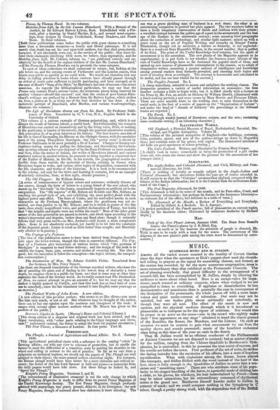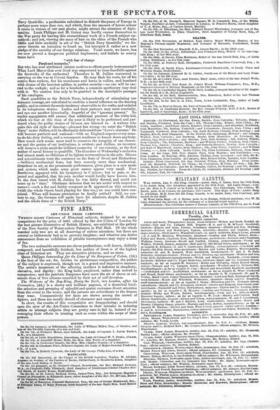MUSIC.
QUADRILLE MUSIC AND M. JOLLIER.
AMONG all the varied scenes enacted in the locality of Covent Garden since the days when the spectators at Rich's puppet-show used the church- bell tolling to prayers as the signal for assembling thereat, and formed, as the sexton has recorded, by far the more numerous congregation, none is more extraordinary than that exhibited at the Promenade Concerts. The art of pleasing everybody, that grand difficulty in the arrangement of a concert-bill, has been accomplished by M. Jullien, simply by allowing the audience to move about when bored. Here is an escape-valve for impa- tience, much wanted at ordinary concerts, where when wedged in we are compelled to listen to everything. If applause or dissatisfaction be less demonstrative and unanimous than is generally the case in consequence of the dissipation of the promenade, the whole passes off with a more bene- volent and quiet under-current of toleration. Our souls may not be satisfied, but our bodies glide about spiritually and noiselessly, as though they were all soul. The effect of the music is new and curious, and the physical medium through which it is introduced so pleasurable as to indispose us for the rigour of criticism. Nor would this be proper in an actor on the scene—one in the crowd who nightly make their " first appearance on any stage admitted to tread the classic ground of the Kembles, the Keens, the Mundens, and the Listens. On such an occasion we must be content to gain what amusement we can from the motley shows and sounds presented; music of the humblest orchestral class being at this time of the year an oasis in the desert. That M. Jullien would be an efficient conductor of the Philharmonic or Ancient Concerts we are not disposed to contend; but as master of music for the million, ranging from the Chimes Quadrille to Beethoven's Sym- phonies, he is unrivalled: in this he possesses the true secret of success, and the results are before the town. First professor of the art of noise, he strikes the daring intruder into the mysteries of his effects, into a state of hopeless mystification. What with explosions among the drums, horns played like trumpets, and fiddles fiddled with the wood instead of the hair of the bow, there is fully enough in the Quadrilles of Jullien to prove him a mu- sician and " something more." There are who attribute some of his popu- larity to his elegant handling of the baton, to agraceful mode of sinking into a chair, to his gloves, his whiskers, his hair immortalized by Punch—these may be minor attractions, but his extraordinary command of rhythmical noises is the grand one. Beethoven himself knocks under to Jullien in potency of crash; and we could compare nothing in the Symphony in C minor, though a pretty strong work, with the stupendous row of the British
Navy Quadrille; a production calculated to disturb the peace of Europe in perhaps more ways than one, and which, from the amount of heroic ardour it raises in visions of our past glories, might attract the attention of diplo- matists. Louis Philippe and M. Guizot may hardly excuse themselves to the War party for leaving this extraordinary work of a French subject un- noticed; and yet, viewing the mass of hair on the chins of the French who fiddle and blow cordially in aid of the "British Navy Quadrille," we dis- cover therein no intention to beard us, but interpret it rather as a new pledge of the security of our foreign relations. Vocal music, we know, has ere now proved a dangerous political implement; and ballads to scurvy tunes have "with fear of change Perplexed monarchs."
But who has ever attributed sinister motives to efforts purely instrumental? What Lord Mayor that ever lived was empowered to issue handbills against the fireworks of the orchestra? Therefore is M. Jullien warranted in carrying on the war at Covent Garden. He may flash his rosin, let off his octave flute rockets, fire his trombones and horns in vollies, and bombard with drums of the heaviest calibre, in perfect security-no one will be car- ried to the cockpit; and as for a headache, a common apothecary may deal with it. We caution him only to be guarded in the descriptive passages of his catalogue.
Such quadrilles as the British Navy, independently of stimulating our dormant courage, are calculated to exercise a moral influence on the dancing public, and to correct the erotic tendency observable in the waltz, and exhaled in its voluptuous strains. Ladies and their partners may meet martially, and eye one another historically, forgetful of the " ignorant present." No tender appogiatura will excuse that additional pressure of the white kid, which we fear at this time of the year is likely to be performed and par- doned when the guilty strains of Strauss are listened to. A waltzer who quits this old style of dancing-pleasant but wrong-to enter the " British Navy" under Jullien, will be effectually delivered from "Love's alarnms." He will become patriotic and national-with an England-expects-every-man- to-do-his-duty feeling, and a consequent readiness to knock down anybody. How much such music must tend to conserve the integrity of our charac- ter and the genius of our institutions, is evident; and Jullien, its inventor, will deserve a niche amid the brilliant memories of our country, as the first author of naval history in quadrille. The thunders of Wednesday's orchestra had almost made us oblivious of its lighter corruscations in the solo. Silence and astonishment were the comment on the feats of Sivori and Richardson -brilliant mechanical feats, but here scarcely more than mechanical. .Grandeur in art, at the promenade performance, gives place to a new mode and system, which make some great names appear very small. Poor Beethoven appeared with his Symphony in C minor; but so pale, so de- jected and appalled, that his own mother would hardly have known him. In the first round with M. Jullien he was fairly floored, and could not come up to " time." Obstinate delusion that we are under with respect to names!-such a flat and flabby composer as B. appeared on this occasion, (with the whole Opera band playing for him too,) no one could have con- ceived. When will human pretensions be finally settled? Still, we ven- ture to say, the German will again have his admirers, despite M. Jullien and the whole force of " the British Navy."



























 Previous page
Previous page